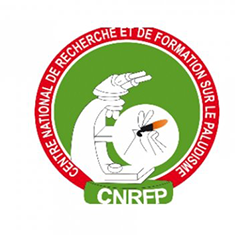
The Centre National de Recherche et de Formation sur le Paludisme (CNRFP) is one of the most important national research centres working specifically on malaria. It is linked to the Ministry of Health and has more than 25 years experience in malaria research activities. CNRFP was founded to serve as technical support for the National Malaria Control Program (NMCP). Its current mandate is i) to participate in the formulation, implementation, supervision, and evaluation of the NMCP activities, ii) to carry out operational and basic research to identify new malaria control tools and to adapt existing ones to the local conditions and iii) to provide training on malaria to health staff and scientists from Burkina Faso and other countries. The Centre has developed several collaborations with research institutions worldwide and in Burkina. It is involved in training students at the Master and Ph.D. level from Universities of Burkina and West Africa.
 |
Dr Sagnon N'Falé is a Medical Entomologist trained on molecular biology who has dedicated his experience to study the biology and the genetic structure of malaria vectors. Sagnon has contributed to elucidate the genetic structure of An funestus and An gambiae using molecular markers and to develop odour baiting traps to sample mosquitoes. His experience was instrumental in the development of the Molecular Biology Lab at CNRFP where he established the An funestus colony in the insectary. Sagnon is the CNRFP lead coordinator on the Essentials Grant. |
 |
Dr Moussa Guelbeogo is a Medical Entomologist who studies the bioecology and population genetics of malaria vectors. He has expertise in polytene chromosomal analysis of Anopheles gambiae and An funestus. Moussa is the Senior field coordinator on the Essentials Grant. |
 |
Dr Antoine Sanou is medical entomologist with strong interest in vector biology and malaria control. Currently as a Post-Doctoral Research Associate on Essentials Grant he is assessing how exposure to next-generation LLINs can influence the mosquito populations characteristics. Furthermore, using experimental hut trials, tracking assays and bench top assay (ViCTA) he is studying mosquito behavioural responses next generation LLINs in Burkina Faso. Throughout this study, Sanou is also assessing the changes in insecticide resistance prevalence and intensity in malaria vectors. His PhD studies involved assessment of the ecology and behaviours of insecticide resistant malaria vectors and implications for control in Burkina Faso. From PhD project, he concluded that the current vector control tools (LLINs and indoor residual spraying) will not be enough to cut residual transmission in Burkina Faso and other African settings and may continue to be eroded by insecticide resistance. |
